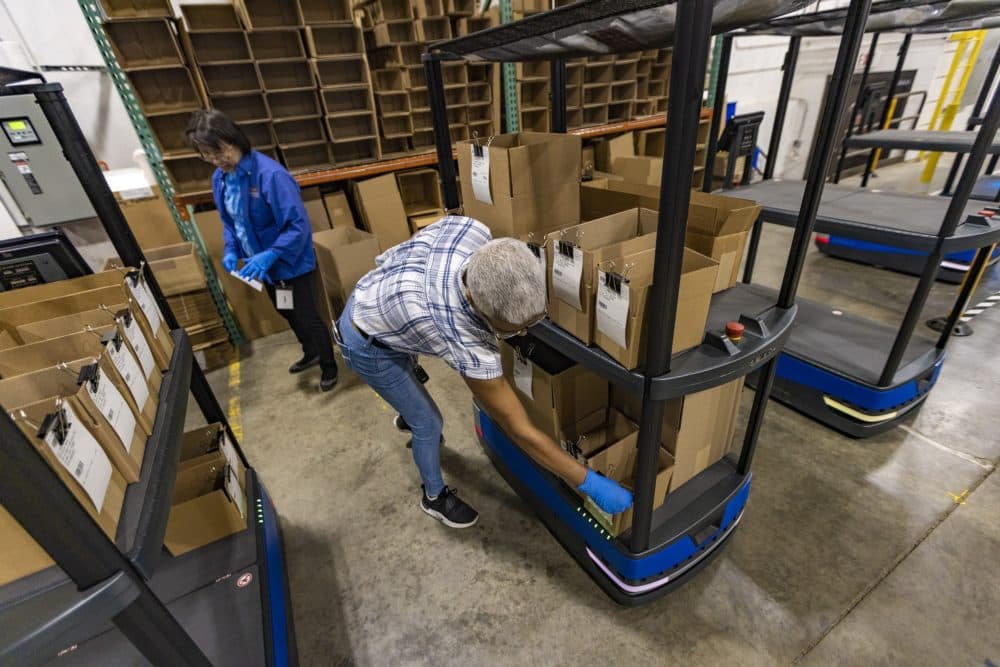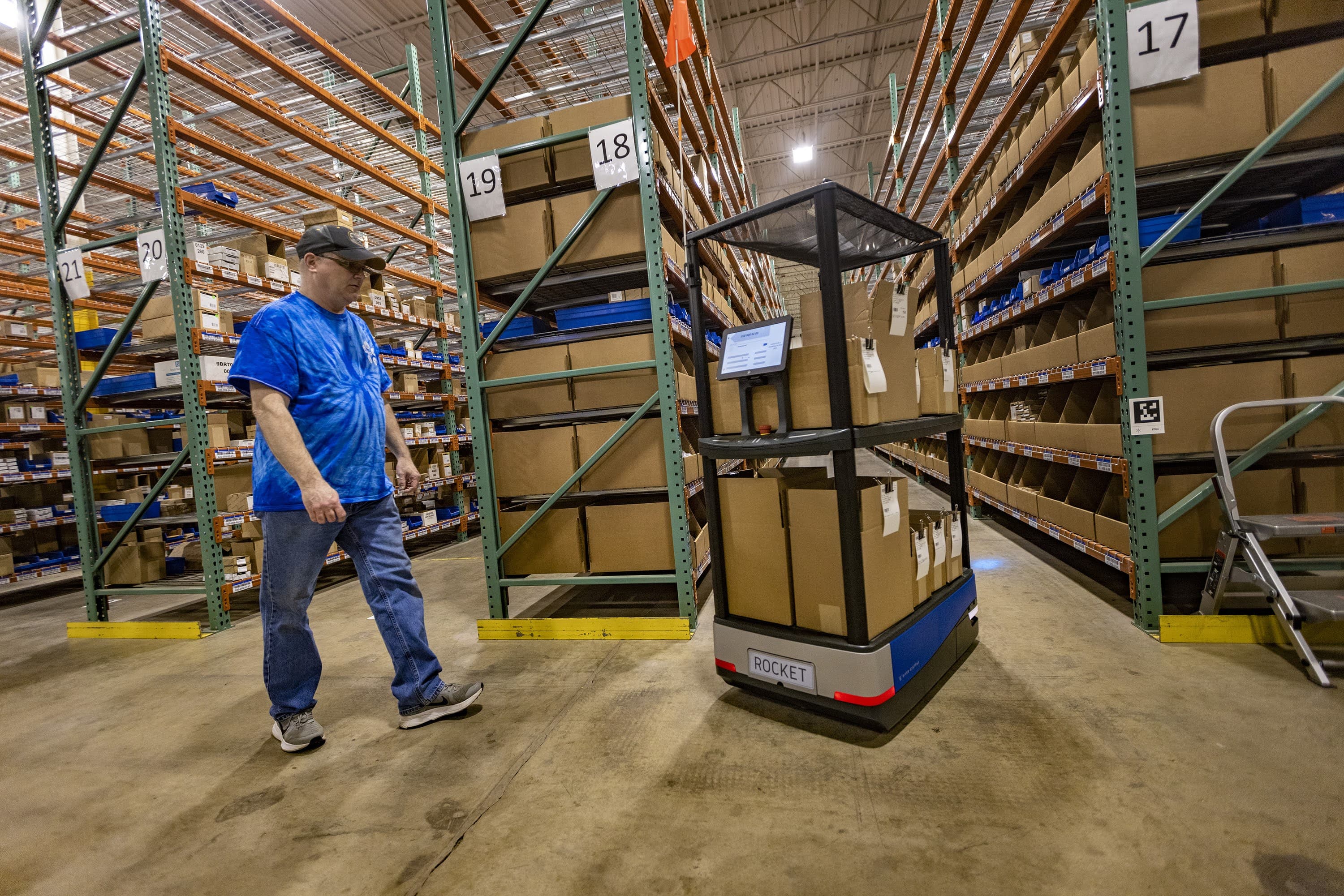Advertisement
Pandemic staffing challenges may be spurring the robot revolution

In a Mansfield warehouse the size of a football field, Gronk, Big Papi and Rocky Marciano carry stacks of boxes through massive aisles.
No, these are not the famed New England sports stars. They're a fleet of robots, named after them. The machines work for Top Notch Distributors, a wholesaler that sells items like bolts, locks and hinges.
The company's employees voted on names for the robots after they were brought into the warehouse earlier this year.
Joseph Montville, who's worked at Top Notch for 26 years, said his job can be hard on the body. He used to push carts laden with heavy merchandise around the warehouse while searching for the items needed to make up orders. When his employer added the robots in January, he said it made a huge difference.
"Once we got these robots, it's less walking," Montville said. "I leave here at the end of an eight-hour day and my bones aren’t aching anymore."

The robots, which go by the generic name Chuck, look like stacks of shelves on wheels. There's a small screen and buttons at the front that are used to operate them.
Chuck is the signature machine developed by Waltham-based 6 River Systems. When Jerome Dubois co-founded the company in 2015, he knew that warehouses were already moving toward more automation. But he couldn't have predicted how quickly demand for the company's robots would rise during a pandemic.
"The demand for labor in warehouses exploded," Dubois said. "There weren't enough people to meet that demand, so companies have been accelerating their implementation of technology to kind of bridge the gap."
Since the start of the pandemic, 6 River Systems has doubled its staff. Dubois predicts demand for its robots will keep growing. According to a McKinsey survey of leading retailers, 80% say they plan to invest more in automation in the next two to three years.
Advertisement
"We've not had to add people as our business has grown. We've added technology to support that growth."
Patrick Houlihan, Top Notch Distributors
Renting a fleet of eight Chuck robots starts at around $200,000 per year. Patrick Houlihan, the director of operations at Top Notch, said it's an investment the company had to make to keep growing in a tight labor market.
Management first introduced the robots in the company's Nevada warehouse in 2020 before implementing them in Mansfield two years later. Houlihan said the machines haven’t replaced any of the existing staff, but they have reduced the need to hire new employees.
"We've not had to add people as our business has grown," Houlihan said. "We've added technology to support that growth."
Houlihan said the robots have also cut training time for new staff by about 90%. Now, associates can focus on learning about the products.
"People don't think door hardware is complex — it is complex." Houlihan said "It’s not just picking stuff off the shelf."
According to the nonprofit MassRobotics, Massachusetts has the highest concentration of robotics companies in the world at more than 400 businesses. This month, Boston Dynamics and Hyundai announced plans to build a $400 million robotics and artificial intelligence research center in Cambridge's Kendall Square.
The advances expected in this industry are likely to change the state's workforce, said Holly Yanco, a robotics professor at UMass Lowell and the director of the New England Robotics Validation and Experimentation (NERVE) center, during a video call.
"If you look at the computers that we're talking on now, they handle all of our emails. There are not people taking shorthand and typing memos," Yanco said. "Jobs change."
A state report on the future of work estimates that between 900,000 and 1.2 million Massachusetts jobs could be replaced by automation by 2030.
That doesn’t mean a million people will be out of work, Yanco said. Instead, she predicts many will have different jobs, and she believes robots will help shape that future workforce. She points to supply chain problems that emerged during the pandemic as one example.
"What if we were able to do more manufacturing here in the state?" Yanco asked. "[We can] have people supervising and programming and training the robots to do things so that we could develop more here in the state as opposed to relying on things coming overseas."
But automation can be both good and bad for the economy.
Daron Acemoglu, a professor of economics at MIT, argues that automation has exacerbated wage inequality in the U.S. over the last 40 years. He worries pay gaps could worsen without thoughtful planning from businesses and lawmakers.
One reason for his concern is the technological investments companies are making to address today's worker shortages. The changes are likely permanent. But Acemoglu points out the tight labor market won't last forever. At some point, more of the workers who left the workforce during the pandemic will want jobs again.
"What's going to happen when these workers return to the labor market? That's a big question mark. (...) I think we may have a rocky road ahead."
Daron Acemoglu, MIT
"What's going to happen when these workers return to the labor market? That's a big question mark," Acemoglu said. "I think we may have a rocky road ahead."
Overall, Acemoglu believes Massachusetts is better shielded from the negative impacts of automation when compared to other states. The Massachusetts economy is diverse and leans more toward high tech sectors, which benefit from automation.
"Massachusetts is not going to tell the U.S. story," Acemoglu said.
But the state's robotics sector may help drive increases in automation more broadly. For the workers at Top Notch Distributors, the robot revolution seems more like a subtle evolution.
Lynda Nguyen printed shipping labels and stuck them onto boxes before placing them on a robot. Once she finished, she pressed a button, and the machine headed off to find the right products.
"Piece of cake," she said. "[It's] like working and playing."
Her colleague Maria Pinto wouldn’t go that far.
“I don’t know about that," she chuckled. "But it’s much easier.”
To Nguyen and Pinto, the machines aren’t exactly taking over. And at least for now, they still need a lot of human help.
This segment aired on August 25, 2022.
